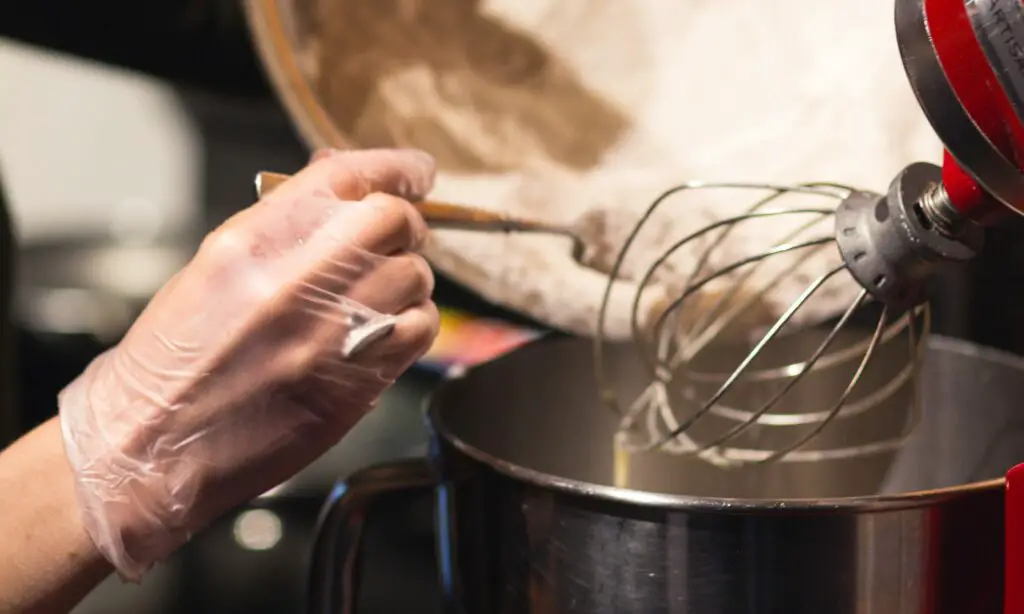The three most popular types of work gloves include the likes of nitrile gloves, vinyl gloves, and latex gloves. All three have advantages and disadvantages. It’s vinyl gloves, however, that have been in the market for decades now.
Something that has been way ahead of its game for decades like vinyl gloves certainly has to have some qualities that are better than most other options. Those are the kinds of qualities and uses of vinyl gloves that will be unraveled in this guide.
Vinyl gloves have been used in the food industry and the healthcare sector for a very long time now. However, there have been some health concerns that have put limitations and considerations (to be discussed later on in this very guide) on the use of vinyl gloves in the food industry and the medical sector.

Food and medicine, however, aren’t the only industries vinyl gloves are limited to. Vinyl gloves are used for painting jobs where the possibility of staining your hands is high.
Similarly, people working at a printing press can also largely benefit from vinyl gloves since the gloves will again offer protection from staining from the ink. They are also used by tattoo artists and salon workers.
Before you can decide if vinyl gloves are right for you and your health, there are many other things that you should know about the use of vinyl gloves, their safety and dangers, and much more. Skim through this guide for all the answers you’ve been looking for.
Where Are Vinyl Gloves Used?
To answer this question correctly, let’s first inform you that there are two kinds of vinyl gloves: powdered vinyl gloves and non-powdered vinyl gloves. It’s the non-powdered vinyl gloves that are preferred by experts working in the food industry and medical sector.
That said, the many possible answers to the question where vinyl gloves are used are as follows.
1.) Vinyl gloves can be used for low-risk work that doesn’t pose the threat of serious viral infections.
2.) They can be used when handling non-hazardous substances.
3.) They can be used as barriers to protect your hands from staining due to paints and inks.
4.) They can be used when you are not handling corrosive acids.
5.) They can be used when you are not handling biomedical waste.
6.) Vinyl gloves can also be used for cleaning at home.
7.) They can also be used by sanitation workers responsible for cleaning the bathrooms at low-risk places where the chances of catching infectious diseases are very less.
Can Nurses Wear Vinyl Gloves?
There’s a great deal of difference between CAN and SHOULD! So, if you ask us if nurses can wear vinyl gloves, we will have to say yes. Nurses can wear vinyl gloves in the states (countries) where vinyl gloves are not banned to be donned by healthcare workers.
If you ask us if nurses should wear vinyl gloves, we will have to say no. No, nurses, physicians, dentists, and surgeons should not wear vinyl gloves even if the gloves are non-powdered.

There are many countries (many states in the US and UK for that matter) that have put a ban on using vinyl gloves within the medical community that handles and deals with patients firsthand.
It’s risky for the staff as well as the patients since vinyl gloves contain phthalates. Ideally, nurses and doctors should wear nitrile gloves.
3 Advantages of Wearing Vinyl Gloves
The very fact that vinyl gloves can be used in many industries if not the food industry or the medical sector says a lot about the versatility and advantages of these gloves. Some of the better advantages that make vinyl gloves very popular are as follows.
1.) Vinyl gloves aren’t ridiculously expensive. Sometimes, when you’re doing basic things like cleaning a table or floor at home (even a restaurant for that matter) where you’re dealing with mild cleaning detergents, vinyl gloves are sensible options.
2.) Vinyl gloves will protect your hands from catching stains. It’s one of the reasons why they’re used in salons and by tattoo artists.
3.) Vinyl gloves are free of latex. Many people are allergic to latex. Although nitrile is the best replacement, it can be expensive. So, vinyl gloves are an affordable option in the place of latex gloves.
2 Disadvantages of Vinyl Gloves
Vinyl gloves were very popular in the 80s and were used for almost all purposes. With time, certain problems were encountered and that happened to give the world an insight into the disadvantages of vinyl gloves. We have shared the most serious concerns in the pointers below.
1.) Vinyl gloves that contain large amounts of chlorine are full of phthalates and that’s very harmful to health. It’s the main reason that vinyl gloves are banned for medical use in certain countries.
This disadvantage has been counterfeited to some extent by using less amount of chlorine in the manufacture of vinyl gloves.
2.) Disposing of vinyl gloves has become quite a task. Most people used to burn them down to get rid of them since they’re not biodegradable. However, when burnt, vinyl releases dioxins that can be carcinogenic if inhaled.
What is the Difference between Sterile Vinyl gloves and Non-sterile Vinyl Gloves?
All the safety gloves should meet certain guidelines set by the FDA in terms of safety. Vinyl gloves are no different. The two types i.e Sterile and Non-sterile have a lot to do with the FDA approval.
Sterile gloves are the ones that fully pass the safety standards determined by the FDA. Only sterile gloves can be used for medical procedures or when handling food items in any way.
Non-sterile gloves are the ones that are FDA-accepted but not FDA-approved. It means they are high-quality gloves but they’re not the highest quality in a way that they can come in touch with the body fluids directly.
So, non-sterile gloves can be used for aseptic purposes only. They cannot be used for medical procedures.
4 Major Differences Between Latex Gloves and Vinyl Gloves
Latex gloves are obtained from natural rubber. Vinyl gloves, on the other hand, are derived from synthetic plasticizers (PVC).
The major differences between the two are as follows:
1.) Latex gloves are more expensive than vinyl gloves.
2.) Latex can cause allergies. Vinyl gloves are cost-effective options for people who are allergic to latex.
3.) Latex gloves are biodegradable; hence, easy and safe to dispose of. Vinyl gloves, on the other hand, are non-biodegradable which makes it difficult to dispose of them.
4.) Latex gloves have more value for high-risk jobs. Vinyl gloves are used when there’s no involvement of corrosive acids, biomedical waste, or hazardous contaminants.
See also: Are Latex or Vinyl Gloves Better?
Vinyl Gloves – Facts and Myths
1.) Vinyl Gloves are Plastic: It’s a Fact!
Vinyl gloves are synthetic. They’re plastics that come from PVC. They do not come from natural sources.
2.) Vinyl Gloves Protect From Viruses: It’s a Myth!
Viruses can pass through the surface of vinyl gloves. That’s the reason they cannot be used at places that involve the risk of viral infections.
3.) Vinyl Gloves Are Abrasion-Resistant: It’s a Myth!
Vinyl gloves cannot offer protection from corrosive acids. They’re no good when dealing with contaminants. Besides, they’re easy to get damaged.
4.) Vinyl and Rubber are the Same: It’s a Myth!
This is one of the biggest myths that need to be busted. Latex gloves come from a natural rubber tree, not vinyl. Vinyl is a form of non-biodegradable plastic that is also known as PVC.
5.) Vinyl Gloves are Not Fully Waterproof: It’s a fact!
Despite being a form of plastic, vinyl gloves are not waterproof. They are water-resistant. It means they can offer protection from water to a certain extent only.
Concluding Thoughts:
Although there are some dangers associated with the use of Vinyl gloves, they are still worth wearing where the working environment is low-risk.
The two biggest advantages of vinyl are, a) they are affordable and b) they are resistant to staining. Hence, vinyl gloves can be very well used at printing presses, hair salons and nail salons, and tattoo parlors.
If you are looking for cost-effective gloves to do the basic cleaning chores at home, vinyl gloves are more sensible options.







